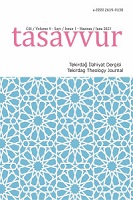‘Âmmînin Mezhebi Kendisine Danıştığı Müftînin Mezhebidir’ Kaidesi Bağlamında Günümüzde Âmmînin Taklid Meselesi
Taqlīd of the Layperson in Today’s World from the Perspective of in the Context of the Legal Maxim: “The Madhhab of the Layperson is the Madhhabb of the Muftī whomi Hhe Consulted”
Author(s): Ömer AslanSubject(s): History of Law, Islam studies, Sociology of Law
Published by: Tekirdağ Namık Kemal Üniversitesi İlahiyat Fakültesi
Keywords: Islamic Jurisprudence; Ijtihād; Mujtahīid; Imitation (Taqlīd); Imitator; Muqallid; ʿĀmmī;
Summary/Abstract: In the period of the Saḥāba (Companions), Tābiʿīn (Successors), and Atbāʿ al-Tābiʿīn (Followers of the Successors), those who had the capacity to do ijtihād on religious issues would act according to their ijtihād without being tied to any a particular person or school. Those who did not have the capacity to perform ijtihād could obtain a fatwā from any muftī whom they consulted, without any school-sectarian affiliation. However, with the emergence of the schools of jurisprudence (madhhab) in II-IV centuries AH, the issues of ijtihād, taqlīd and madhhab have been discussed and different opinions have emerged on the subject. Some scholars argue that those who do not have the capacity to do ijtihād should do taqlīd, while others argue that every legal person (mukallaf) should do ijtihād in their religious affairs according to their own capabilities and act according to the conclusions reached. While those who argue that taqlīd is necessary for a Muslim who does not have the proficiency in ijtihad claim that a Muslim should adhere to a madhhab in his religious-practical life, another group argues -based on the legal maxim “Ammī does not have a madhhab. His sect is that of the mufti he consults”- that a Muslim may act upon the consultation of the scholar he wants to follow. In this study, the issue related to the situation of the Muslim who does not have competence to do ijtihād has been examined. In this context, the nature of taqlīd is emphasized and scholars’ opinions regarding opinions about the taqlīd of the layperson (ʿāmmī) are addressed.
Journal: Tasavvur Tekirdağ İlahiyat Dergisi
- Issue Year: 9/2023
- Issue No: 1
- Page Range: 869-899
- Page Count: 31
- Language: Turkish

